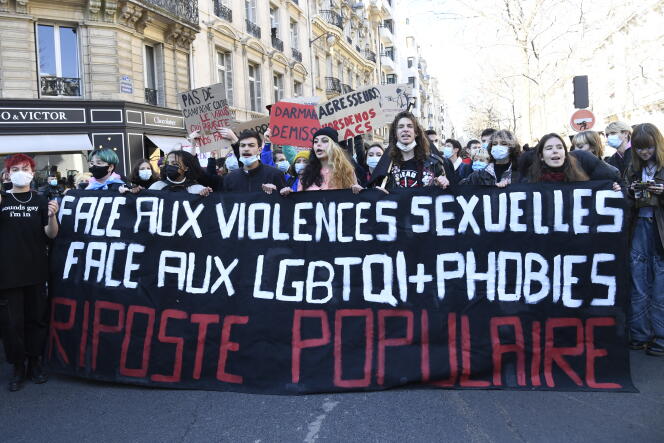
Last year saw once again a rise in the number of anti-LGBTQ+ violent acts, according to data published on Monday, 16 May, by the ministerial statistical service for internal security. In 2021, 3,790 offenses committed "because of sexual orientation or gender identity" were recorded by the police and gendarmerie services, compared to 2,970 in 2020 (an increase of 27.6%). Is this a reflection of the increase in violent acts against sexual minorities or because victims are now speaking more openly and are more inclined to go to police and gendarmerie stations?
Among them were 2,170 crimes and offenses (28%) and 1,620 minor infractions (16%). Slander and insults were the most prevalent, followed by physical attacks. According to this official data, public spaces are the primary place of homophobia. However, due to the recent Covid-19 lockdowns, more incidents occurred at home (24%, compared to 20% before the pandemic). Men are the main targets of these crimes and offenses, with young people being overrepresented among the victims.
Acceptance on one side, rejection on the other
The number of anti-LGBTQ+ violent acts has doubled since 2016, the first year in which figures linked to complaints about crimes, misdemeanors and offenses aggravated by a discriminatory motive because of sexual orientation and gender identity were published separately. The Interior Ministry documented an average increase of about 15% per year. "I cannot believe that there is no real increase in the number of acts," said Sophie Elizéon, the interdepartmental delegate for the fight against racism, anti-Semitism and anti-LGBTA+ hate. She said, "As opinion polls show, we are certainly seeing greater acceptance in society, but at the same time, homophobic people are becoming more and more vicious and vindictive. They are turning to violent acts."
All observers confirmed this twofold trend. Flora Bolter, the Jean Jaurès Foundation's LGBT observatory co-president, said, "we have gone from denial to rejection." The activism in favor of equal rights that resulted in recent legislative achievements (same-sex marriage and access to assisted reproductive technology for all women) "have opened the door to more representations of LGBTQ+ people and, consequently, to more expressions of rejection," she pointed out.
We may be currently witnessing a form of "normalization" of sexual minorities. But the Commission nationale consultative des droits de l'homme (CNDH, National Consultative Commission on Human Rights) argued in its 2022 report released on the International Day against Homophobia, Biphobia and Transphobia (May 17) that "deviations from sexual and gender norms are still considered 'deviations,' which have not entered into 'normality' but are simply 'normalized' or 'tolerated.'" While 85% of heterosexual people surveyed consider homosexuality an acceptable form of sexuality, only 75% say they would be willing to accept a homosexual child, preferring it to be heterosexual.
You have 49.48% of this article left to read. The rest is for subscribers only.